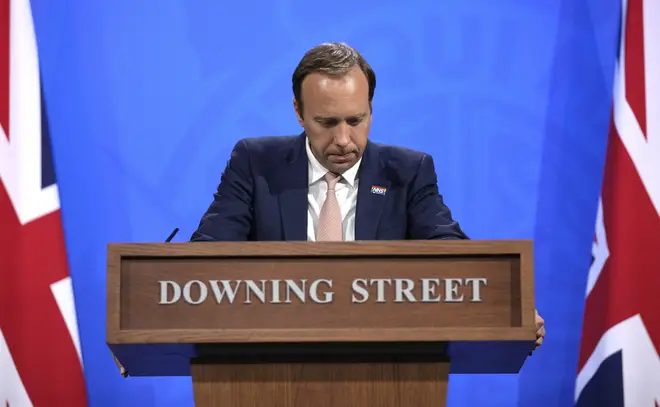
Tom Swarbrick 4pm - 6pm
27 May 2021, 19:17 | Updated: 27 May 2021, 19:48

Health Secretary warns Covid cases are rising
Matt Hancock has confirmed that the Indian Covid-19 variant has become the dominant strain in the UK.
Speaking during a Downing Street press conference on Thursday, the Health Secretary said that up to three-quarters of new coronavirus cases were the Indian variant.
LBC's Westminster Correspondent Ben Kentish reported that data currently suggests the UK is currently the only European country where the Indian strain has become the dominant strain.
Read more: PM's handling of Indian variant 'unsurprisingly dreadful,' says Independent SAGE member
Read more: France to impose new quarantine measures on UK visitors amid concern over Indian variant
It comes after the French government announced British travelling into the country will need to quarantine in a bid to stop the Indian coronavirus variant from spreading there.
"The latest estimates are that more than half and potentially as many as three-quarters of all new cases are now of this variant," Hancock said.

Caller is concerned over Indian Covid variant
"As we set out our road map we always expected cases to rise, we must remain vigilant.
"The aim, of course, is to break the link to hospitalisations and deaths so that cases alone no longer require stringent restrictions on people's lives."
His comments came as it emerged that 6,959 cases of the Indian variant of coronavirus had been confirmed in the UK up to May 26, a rise of 3,535 on the previous week.
Public Health England (PHE) said the local areas most affected by the Indian variant of coronavirus continued to be Bolton, Bedford and Blackburn with Darwen, which have seen 1,354, 366 and 361 confirmed cases respectively.
PHE also said that across England 201 people who were confirmed to have the Indian variant had attended A&E up to May 25, resulting in 43 admissions.
Hospital attendances and admissions are predominantly in unvaccinated people, it added.
Hancock said the increase in cases of the Indian variant remained focused in "hotspots" where surge testing and vaccinations were taking place.
He added "The increase in cases remains focused in hotspots and we are doing all we can to tackle this variant wherever it flares up.
"Over the past six months we now have built a huge testing capacity at our disposal and we are using this to surge testing into the eight hotspot areas and other places where the cases are lower but rising.
"In the hotspot areas we are surging vaccines, too, for those who are eligible, in Bolton for instance we have done 17,147 vaccinations in the last week."
Indian variant is now dominant in the UK, Matt Hancock announces.
— Ben Kentish (@BenKentish) May 27, 2021

During the briefing, Hancock also insisted the Government worked "as hard as we could" to protect care homes during the Covid-19 pandemic, following damning criticism from Dominic Cummings.
The Health Secretary previously said Boris Johnson's team "threw a protective ring" around care homes, claims which Mr Cummings said were "complete nonsense".
But speaking during a Downing Street press conference this afternoon, Hancock said: "We worked as hard as we could to protect people who live in care homes, and of course those who live in care homes are some of the most vulnerable to this disease because by its nature it attacks and has more of an impact on older people.
Read more: Health Secretary Matt Hancock should have been fired for lying, says Cummings
Read more: Matt Hancock brands Dominic Cummings' allegations as 'unsubstantiated and untrue'
"Now when it comes to the testing of people as they left hospital and went into care homes, we committed to building the testing capacity to allow that to happen.
"Of course it then takes time to build testing capacity.
"In fact, one of the critical things we did was set the 100,000 target back then to make sure we built that testing capacity and it was very effective in doing so."
During the conference Hancock also repeatedly said "there will be a time" when actions made during those crucial earlier months will be properly looked at.
The claim parroted an earlier statement made by Boris Johnson, who said they "did everything we could to protect the NHS" and care homes.